Principles of Finance with Excel (Основы финансов c Excel)
Подождите немного. Документ загружается.

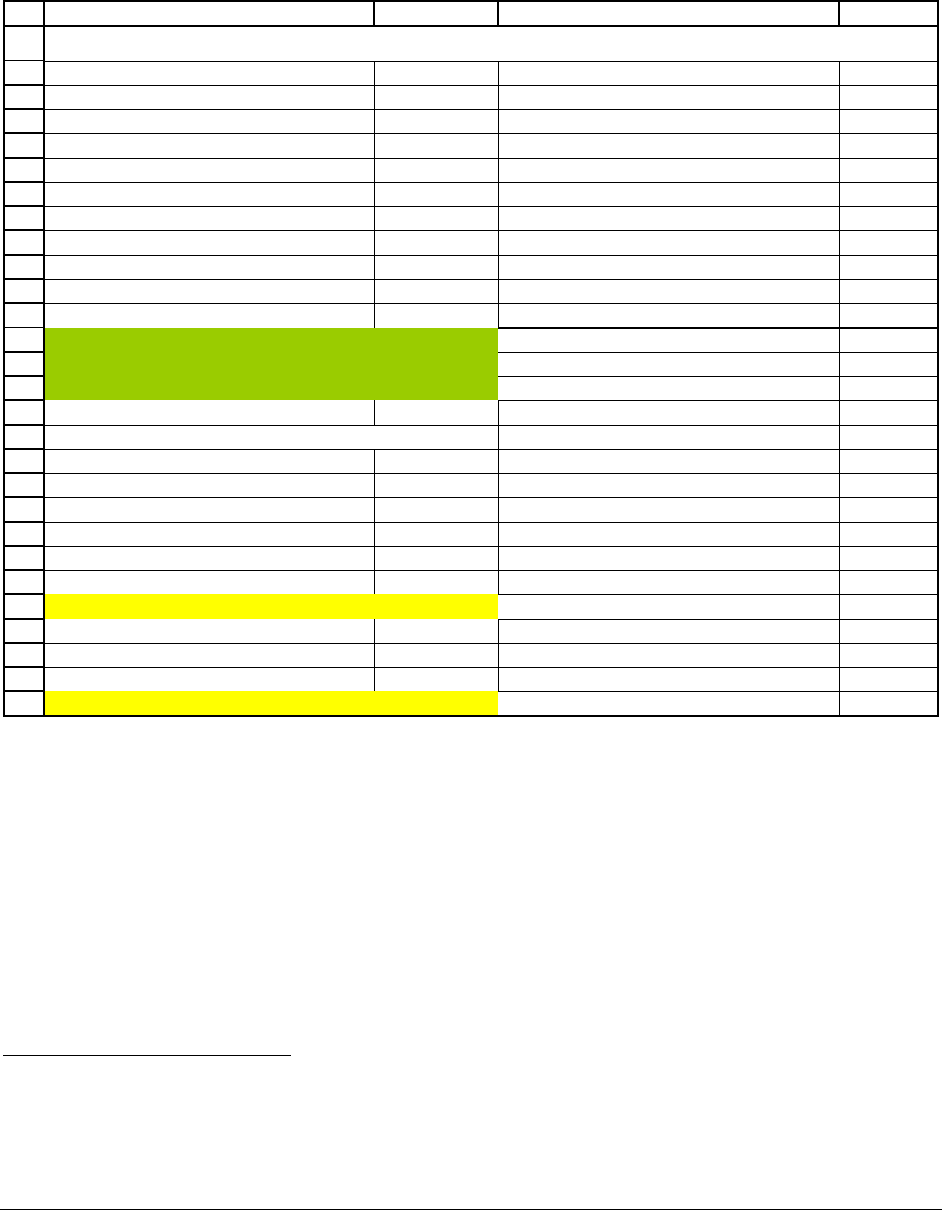
PFE Chapter 22, Dividend policy and firm valuation Page 12
very unlikely—read the note which follows the spreadsheet). In this case, John would still be
better off than if he had paid himself a dividend:
1
2
3
4
5
6
7
8
9
10
11
12
13
14
15
16
17
18
19
20
21
22
23
24
25
26
27
28
FG HI
Assets Liabilities and equit
y
Cash after repurchase 2,000 Debt 10,000
Taxis 20,000 Equity
Stock 5,000
Accumulated retained earnings 10,000
Subtract repurchase of stock -3,000
Total assets
22,000
Total liabilities and equit
y
22,000
Corporate tax rate 30%
Capital gains tax 15%
Ordinary income tax rate 40%
John sells his taxi compan
y
for $40,000
Sale price 40,000
Pay back net debt 8,000 <-- =I4-G4
Net to equity 32,000 <-- =G18-G19
Book value of equity 15,000 <-- =SUM(I7:I8)
Taxable gain 17,000 <-- =G20-G21
Taxes on capital gain (15%) 2,550 <-- =$B$14*G22
Net to John from sale 29,450 <-- =G20-G23
Add back repurchase of stock 3,000
John's taxes on repurchase (15%) 450 <-- =$G$14*G26
Total 32,000 <-- =G24+G26-G27
JOHN'S TAXI COMPANY--after repurchase
Some bad tax advice from the author: In order to minimize taxes, John should consult his
accountant before repurchasing the stock.
4
It is highly unlikely that the whole repurchase would
be taxed as a dividend. It could be structured as a payout of capital (in which case there would
be no taxes). The accountant might also be able to value John’s basis in the stock (what he
originally paid for it, plus the accumulated capital gains). Here’s an example:
4
The author of this book barely understands finance and is certainly not a tax accountant. Therefore everything in
the next few paragraphs is impressionistic and probably wrong in details (although hopefully right in spirit).
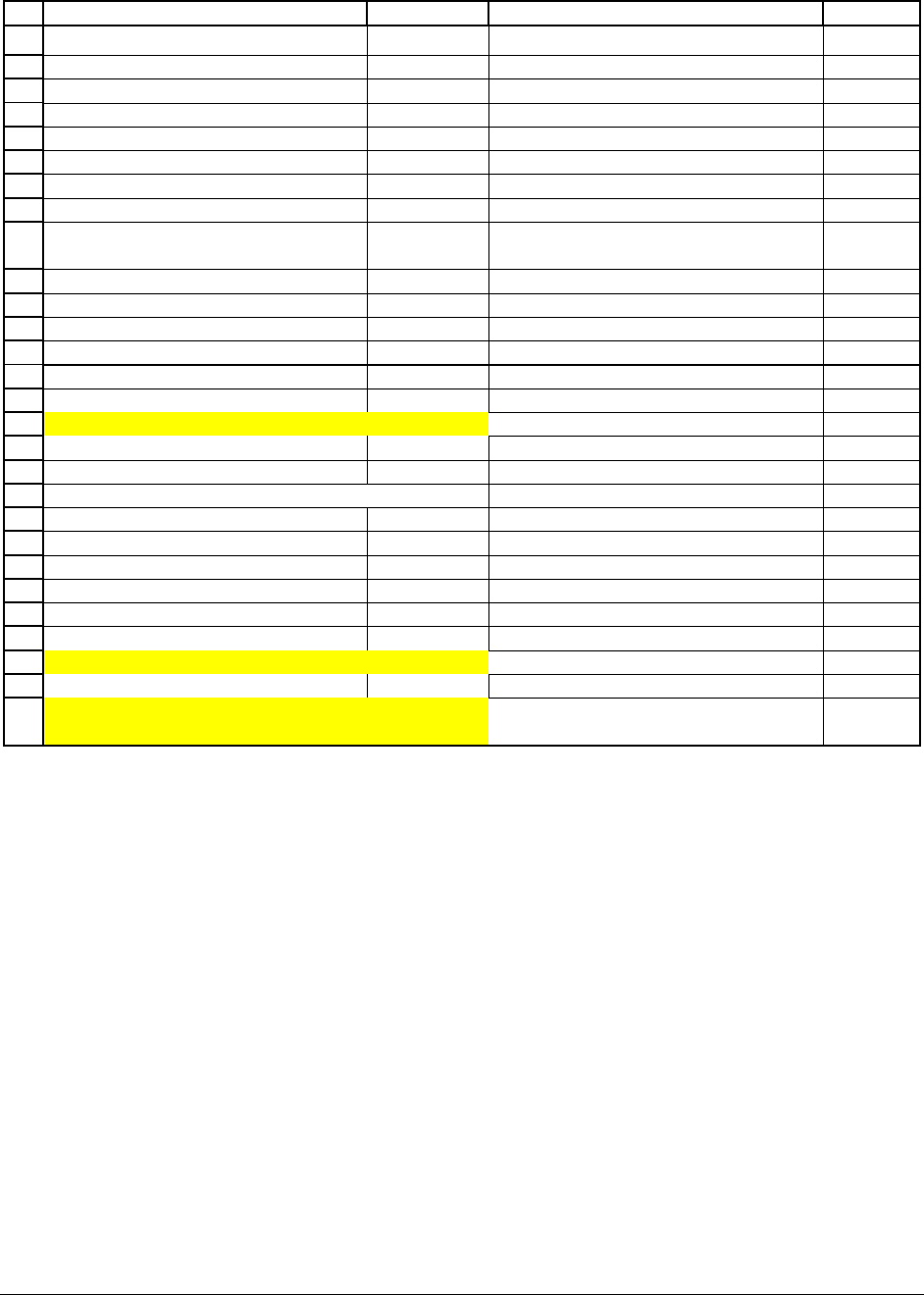
PFE Chapter 22, Dividend policy and firm valuation Page 13
31
32
33
34
35
36
37
38
39
40
41
42
43
44
45
46
47
48
49
50
51
52
53
54
55
56
57
58
FG HI
Accountant reasoning?
Assets Liabilities and equit
y
Net debt 5,000
Enterprise value 40,000 Equity, market value 35,000
Total assets
40,000
Total liabilities and equit
y
40,000
Amount spent on repurchase 3,000
As a percent of market value
of equity
8.57% <-- =G38/I35
Book value of equity 15,000
basis = 8.57% of book equity 1,286 <-- =G39*G41
Taxable gain on repurchase 1,714 <-- =G38-G42
Taxes on gain at capital gains tax 257 <-- =G14*G44
Net from repurchase 2,743 <-- =G38-G45
John sells his taxi compan
y
for $40,000
Sale price 40,000
Pay back net debt 8,000 <-- =I34+G38
Net to equity 32,000 <-- =G50-G51
Book value of equity 13,714 <-- =G41-G42
Taxable gain 18,286 <-- =G52-G53
Taxes on capital gain (274286%) 2,743 <-- =$B$14*G54
Net to John from sale 29,257 <-- =G52-G55
Total: net from sale + net from
repurchase
32,000 <-- =G56+G46
Note: The accountant reckons as follows:
• Before the payout of cash, the company is worth $40,000, which makes the market value
of the equity $35,000.
• By paying out $3,000 in cash for stock in the company, John has effectively repurchases
8.57% of the company’s equity. Since the book value of the company’s equity is
$15,000, John has a capital gain of $1,714 (=3,000 - 8.57%*15,000) on the repurchase.
This capital gain will be taxed at 15% (=$257), so that John will net $2,743 from the
repurchase.

PFE Chapter 22, Dividend policy and firm valuation Page 14
• Now when John sells the company for $40,000, he will first have to pay off its net debt of
$8,000 (the repurchase used $3,000 of cash and raised the net debt from $5,000 to
$8,000). This leaves him with a market value of equity of $32,000 which has book value
of $13,714 (=$15,000 – 8.57%*15,000). This gain also gets taxed at the capital gains tax
rate of 15%.
• This leaves John with $32,000.
22.3. Messages
So what are we saying about dividends?
1. In a pure
22.4. Dividends (satisfaction now) versus capital gains (enjoy later)
Up to this point we’ve established that if you’re going to sell your company, dividend
taxes make it unwise to first pay yourself a dividend. But what if you’re not going to sell the
company right away? Should you leave the money in the company, for that golden day when
you’re going to sell it and benefit from the lowered capital gains taxes? Or should you pay
yourself a dividend?
It all depends, of course, on the level of trust you have in the managers of your company.
In the case of John and Mary, this is easy—they manage their own companies, and they wouldn’t
do anything to harm themselves. In this case they should leave the money in the company,
where it can earn the same amount (????) as if they paid it out.

PFE Chapter 22, Dividend policy and firm valuation Page 15
Share Repurchases Substitute for Dividends
Forbes Growth Investor, Vahan Janjigian Editor, Vol. 3, No. 9, Page 1, September 2002.
The total return on equities is composed of two components:
dividends and capital gains. Since the 1980s, however, the
proportion coming from dividends has been shrinking.
Furthermore, dividend yields (i.e., dividend per share divided by
stock price) and payout ratios (i.e., dividend per share divided by
earnings per share) have been falling steadily. Many experienced
investors take this as prima facie evidence that stocks remain
overvalued despite a tremendous two-year sell-off.
Value investors in particular believe that steadily rising cash
dividends are an indication of financial health. These investors
often shun stocks that lack a long history of dividend payments.
But others, such as growth investors, believe dividends are not
very meaningful.
A recent article in the Journal of Finance, a leading scholarly
publication, provides evidence that the demise of the cash
dividend is just an illusion. The authors, Gustavo Grullon and
Roni Michaely, argue that focusing only on dividends ignores an
increasingly important form of cash payout to stockholders: share
repurchases. Cash dividends have been increasing at an
annually compounded rate of only 6.3% since 1980. Yet cash
spent on share repurchases has been rising at a much more
rapid clip of 18.4% compounded annually. Furthermore, cash
spent on share repurchases now exceeds that spent on
dividends. And total cash paid out (i.e., dividends plus
repurchases) as a percentage of earnings has actually been
rising during the period studied.
Our tax code explains much of this behavior. When corporations
pay dividends, investors are forced to pay taxes. In fact,
dividends are taxed at the ordinary rate. But when corporations
initiate share repurchases, investors can avoid taxes altogether
by choosing not to sell. Yet if they do sell, they are taxed at the
capital gains tax rate, which is much lower than the ordinary tax
rate.
This was the case thirty years ago as well. So why weren’t share
repurchases as popular then? Grullon and Michaely argue that
share repurchases didn’t really start growing in popularity until a
1982 regulatory reform, which made it less likely that
repurchasing firms would be accused by the SEC of trying to
manipulate their stock prices.

PFE Chapter 22, Dividend policy and firm valuation Page 16
There are a number of lessons to be drawn from this study. First,
those who argue that stocks remain overvalued simply because
dividend yields or dividend payout ratios are historically low are
being shortsighted. They should instead focus on total cash
payouts. Second, there should be no doubt that, good or bad,
regulatory reforms affect firm behavior. Well-managed firms will
do what is best for shareholders. As long as cash dividends are
unfavorably taxed, investors will prefer capital gains. And as long
as regulators allow it, good corporate boards will deliver what
shareholders want.
Which brings us to a very important point. Dividends are paid from
after-tax dollars. Taxing investors again for receiving those
dividends imposes a very heavy burden. Regulators should
eliminate this double taxation. Dividends should either be treated
as a tax-deductible expense for corporations, or tax-exempt
income for individuals.
Source:
https://www.forbesnewsletters.com/fagin/index.jhtml?page=sample
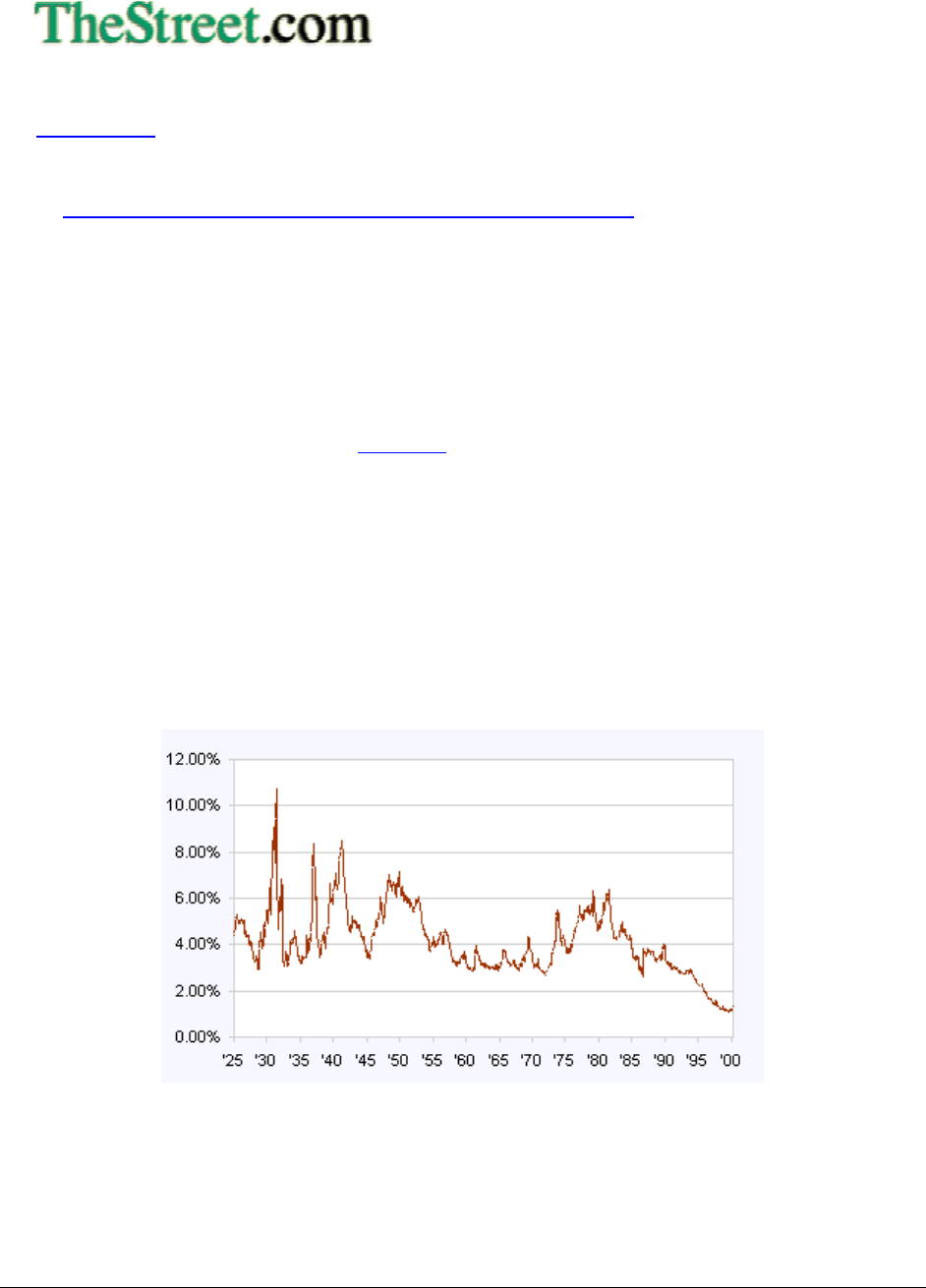
PFE Chapter 22, Dividend policy and firm valuation Page 17
Open Book
Why Dividends? There Doesn't Seem to Be a Good Answer
By Don Luskin
Special to TheStreet.com
6/4/01 4:26 PM ET
URL: http://www.thestreet.com/comment/openbook/1449809.html
Remember Bill Cosby's act in the 1960s? As a child he used to ask a profound question that
adults were too grown up to ask: "Why is there air?"
With a child's innocence, let us ask, "Why are there dividends?"
Is this a question we should be too grown up to ask? An awful lot of investment gurus think that
dividends are awfully important. For example, I noticed over the weekend that Jim Jubak,
senior editor at MSN Money Central, is saying, "What this stock market needs is a really juicy
5% yield. Instead, the dividend yield on stocks that make up the Standard & Poor's 500 is
down to a paltry 1.23%. Thunderation!"
Jubak is right, in the sense that dividend yields are near historic lows -- even after this year's stiff
correction. Take a look at the chart below. Dividend yields today are less than half of what they
were at the top of the market in 1929.
Annual Dividend Yield: S&P 500
Source: Global Financial Data
Jubak, and many other observers, would argue that today's low dividend yields are symptomatic
of our overvalued markets. Well, maybe markets are overvalued. But I believe dividend yields
are so low for another reason: Investors are beginning to ask our childish question: "Why are
there dividends?" And they're not finding good answers. So dividends are becoming less and less
important.
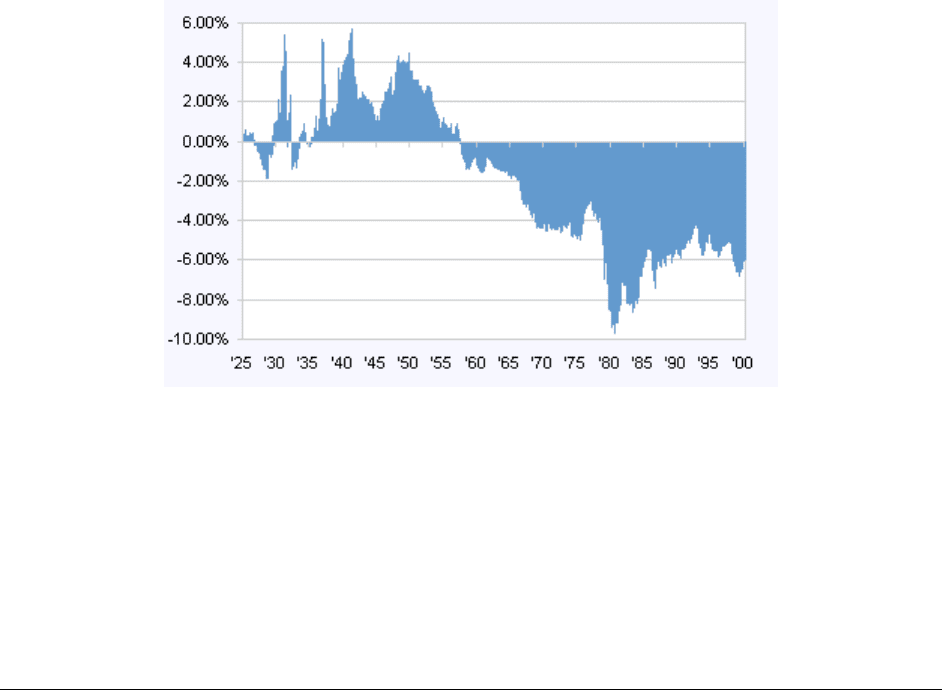
PFE Chapter 22, Dividend policy and firm valuation Page 18
Just think about how silly it all really is. Why would a shareholder want a company to send him
his own money back? That's a confession by the investor that he would really rather not invest in
that company to begin with. And it's a confession by the company that its investors can invest
their money more profitably than the company can.
More and more investors and companies are seeing it this way. But there was a time when
everyone felt like Jubak. In those days, dividend yields on stocks had to be high because
investors saw high dividends as compensating for the risk of equity ownership. When dividend
yields were low, investors reasoned they'd be better off investing in the same company's bonds.
After all, why not earn a higher return with less risk?
In fact, for most of the last century, the conventional wisdom was that whenever the dividend
yield on the stock market fell below the coupon yield of the bond market, it was time to sell
stocks. Take a look at the chart below, which shows the difference between the dividend yield on
the S&P 500 and the coupon yield on Moody's Aaa Corporate Bonds Index. When stocks
yielded less than bonds briefly in 1929, that was one of the greatest stock market sell signals in
history.
Yields: Moody's Aaa Corporate Bonds Minus S&P
500
Source: Economagic and Global Financial Data
But then in August 1958, something very strange happened. The dividend yield on the S&P 500
fell below the coupon yield on Moody's Aaa bonds -- and it never came back. For some reason,
at that moment, the world decided that dividends weren't so important after all. And dividends
have declined in importance ever since.
What happened in 1958 to change investors' preferences so profoundly? Perhaps it happened
then because the late 1950s saw the dawn of the age of inflation in America. Bond yields had to
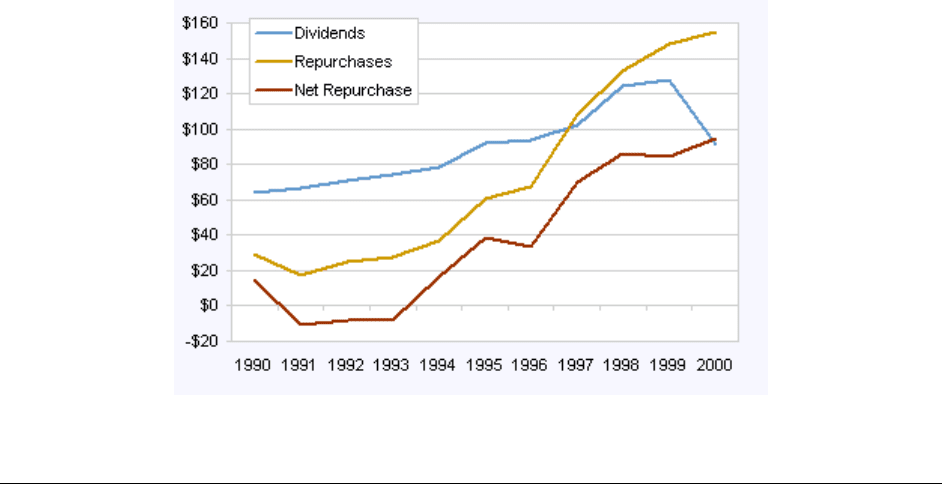
PFE Chapter 22, Dividend policy and firm valuation Page 19
rise in relation to equity yields because bonds are completely unprotected against the ravages of
inflation.
Or perhaps it was because the 1950s was the dawn of the age of the individual investor, in which
pioneers like Merrill Lynch brought Wall Street to Main Street. When individuals had poor
access to markets, they needed dividends as a low-cost way of getting their money back. As their
access improved, they needed dividends less because they could simply pick up the phone and
sell shares if they needed cash.
Or perhaps it was because the 1950s was the dawn of the age of financial economics. Academics
like Harry Markowitz -- who eventually won the Nobel Prize for this work -- were beginning to
codify the realities of investment risk and return. And one of the first lessons was that there was
nothing special about dividends as a component of total equity returns.
Twenty-five years later, in the 1980s, another nail was driven into the coffin of dividends. That's
when companies started to learn that paying dividends wasn't the most efficient way to return
money to shareholders -- buying back their own stock in the open market was smarter.
Repurchases allow investors to decide when and how much to cash in. And investors get to
decide whether to bear a taxable event -- and if they do, to pay the favorable capital gains tax
rate, not the higher ordinary rate they would have paid on dividend income. And investors who
don't sell their shares back to the company benefit from reduced earnings dilution.
This logic has been so powerful that, starting in 1997, the total value of share repurchases by
S&P 500 companies exceeded the total value of dividends paid. Take a look at the chart below:
The spread between repurchases and dividends has gotten wider every year since 1997. And last
year, even the value of net repurchases (repurchases minus the value of new stock issued)
exceeded dividend payouts for the first time.
Dividends and Repurchases (in Billions): S&P 500
Source: Morgan Stanley

PFE Chapter 22, Dividend policy and firm valuation Page 20
This means that to understand the true yield of the equity market -- which has to include both
dividends and repurchases -- you would have to at least double the dividend yield quoted by
commentators like Jubak.
But while this perhaps blunts Jubak's point about overvaluation, it tends to confirm his broader
point that payouts to stock investors are important. Indeed, the mystique of dividend yields is far
from dead. Many companies that feel they have lots of good things to do with their money other
than pay it out to their investors still pay dividends or engage in buybacks. How do they do it?
Well, it's simple -- and utterly crazy.
There are many companies that pay dividends that have to borrow money in the debt market in
order to do it. If the purpose of a dividend is to return surplus cash to shareholders, then why
would any company that had debt pay a dividend? A company in debt has no surplus cash -- by
definition. But hundreds and hundreds of companies both borrow and pay dividends at the same
time.
For example, in the first quarter Dow Chemical (DOW:NYSE) spent $158 million in net interest
expenses (accrued interest expense less capitalized interest and debt income) servicing its $10.5
billion in debt. The same company spent $260 million paying dividends of 29 cents a share.
And it gets even nuttier when we start looking at buybacks.
Morgan Stanley Dean Witter's U.S. Equity Strategist Steve Galbraith told me, "Want to know
something almost as screwy as borrowing in the bond market to pay dividends? Our wonderful
tax and options accounting system has created the following situation -- of the top one-dozen
issuers and the top one-dozen buyers back of stock in the S&P, five companies are on both lists!
How inefficient and stupid is that?"
So what is there about dividends -- directly, or in the form of repurchases -- that is still so
attractive to investors? "Why are there dividends?"
Dividends can't exist simply so that investors can earn income from their investments. Anyone
who needs cash from his investment portfolio can have it with a mouse click, just by selling
some of his shares. And doing it that way, the investor controls the amount and the timing -- and
from which of his stocks he wants the income.
And dividends can't exist as a discipline on company management, forcing them to turn a
consistent profit. If they want to pay a dividend, they can simply borrow to do it. And if they
want to repurchase shares, they can just issue more later.
Dividends remain one of the great mysteries, like "Why is there air?"
By the way, if you're too young to remember Cos in the 1960s, the answer to the question is: "To
blow up basketballs."
Don Luskin is president and CEO of MetaMarkets.com and a portfolio manager of OpenFund, an aggressive growth
fund investing in the New Economy. OpenFund strives to be fully invested, expecting to be at least 90% invested
under most market conditions. At time of publication, OpenFund was long futures contracts on the S&P 500 and

PFE Chapter 22, Dividend policy and firm valuation Page 21
Microsoft, although holdings can change at any time. Luskin appreciates your feedback and invites you to send it to
Don Luskin.
